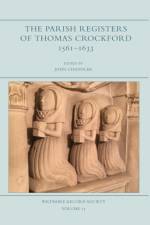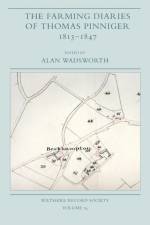351
Thomas Crockford (1580-1634) came to Wiltshire in 1603 as schoolmaster at Stockton, and from 1613 until his death was vicar of Fisherton Delamere. For much of this time he assisted his neighbours the rectors of Wylye and Stockton, and began new registers for each of these three adjacent chalkland parishes in the Wylye valley of south Wiltshire. He assiduously collected and copied information from earlier registers and then continued them, for each parish, until shortly before his death. In doing this he was following an instruction of 1598, as many clergy did at the time, but what makes his registers unusual, if not unique, is the manner in which he set about his task. Crockford, unlike most of his parishioners, was proficient in Latin, and into his registers he wrote not only the basic details of baptisms, marriages and burials, but also relationships, occupations, causes of death, fortunes and misfortunes, and thumbnail character sketches of everyone who crossed his path at altar, font or graveyard - and all in Latin. In addition, by enquiring of families and elderly parishioners, he tried to discover details of those whom he had recorded from before his time. When writing about the local gentry, fellow clergy, and leading members of society he was generally deferential and complimentary, to the extent that some of his more expansive efforts read as if they were funeral orations; but when it came to the less exalted members of his congregation he was briefer and more candid, knowing that they could not read his comments. This remarkable mirror of rural society in the early 17th century is not a new discovery, but it is now published for the first time in translation and in its entirety. The work of translation has been undertaken by Christopher Newbury and Steven Hobbs, with additions by John Chandler, who has edited the volume and contributed an introduction and detailed indexes.


